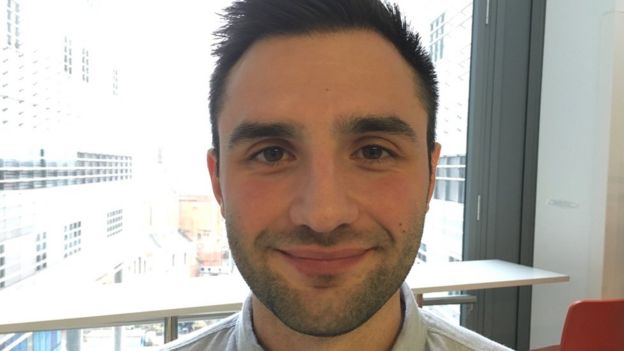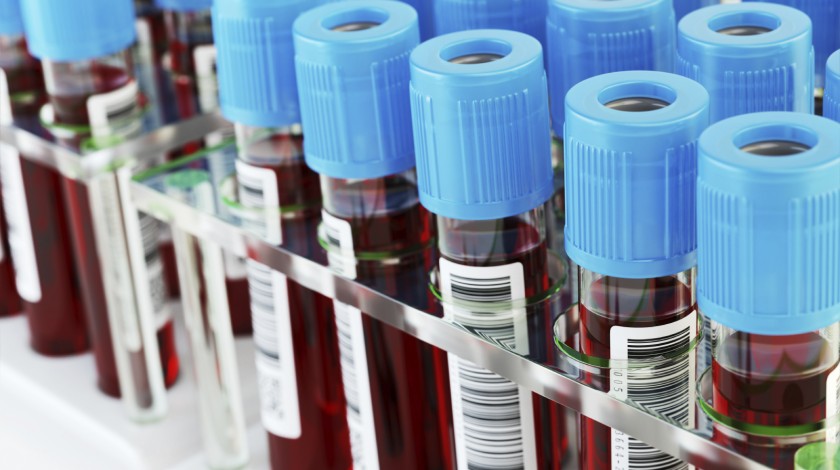Haemophilia A trial results ‘mind-blowing’

Haemophilia A trial results ‘mind-blowing’
British doctors say they have achieved “mind-blowing” results in an attempt to rid people of haemophilia A.
Patients are born with a genetic defect that means they do not produce a protein needed to stop bleeding.
Thirteen patients given the gene therapy at Barts Health NHS Trust are now off treatment with 11 producing near-normal levels of the protein.
Jake Omer, 29 from Billericay, Essex, was on the trial and says he feels like he has a new body.
Like 2,000 other people in the UK, his body could not make clotting factor VIII.
A minor injury used to cause severe bleeding. He remembers losing two front teeth as a child and bleeding for days afterwards.
Even the impact of walking would lead to bleeding in his joints and eventually cause arthritis.
Jake has needed at least three injections of factor VIII a week for most of his life.
But in February 2016, he had a single infusion of gene therapy.
 Image copyrightJAMES GALLAGHER / Image captionJake Omer: ‘Like a new body’
Image copyrightJAMES GALLAGHER / Image captionJake Omer: ‘Like a new body’Jake told the BBC: “I feel like a new person now – I feel like a well-oiled robot.
“I feel I can do a lot more. I feel my body allows me to do more.
“I don’t think I would have been able to walk 500m without my joints flaring up, whereas now I think sort of two, three, four-mile walk – I could quite easily achieve that.”
The first time he knew it had worked was four months after the therapy when he dropped a gym weight and bashed his elbow.
He started to panic, but after icing the injury that evening, everything was normal the next day.
To continue reading please visit:
http://www.bbc.co.uk/news/health-42337396
Television news following today’s announcement can be viewed below courtesy of Tainted Blood
Haemophilia Gene Therapy Breakthrough : 14th December 2017
Jake Omer, 29 from Billericay, Essex, was on the trial and says he feels like he has a new body.
Scientists believe they are on the way to finding a cure for haemophilia A, the bleeding disorder that currently requires sufferers to inject themselves every other day to avoid life-threatening complications.
One dose of a gene therapy given experimentally to 13 patients by NHS doctors in the UK has allowed them all to come off treatment. These were men – most sufferers are – who would not only bleed without stopping from an injury but would bleed into their joints even in their sleep causing pain and disability, without frequent injections of a clotting factor. None of them now bleeds spontaneously in that way.
“I think it’s a huge step forward,” said Professor John Pasi, Haemophilia Centre director at Barts Health NHS Trust and one of the authors of the study. “Gene therapy for haemophilia has historically been the Holy Grail. Our patients have to treat themselves at least three times a week and even then they may still bleed. The treatment burden is massive.
“The opportunity to give them a one-off treatment perhaps for a lifetime but maybe for many years is a huge opportunity. It could transform their care.”
Patients were recruited from around England and all injected with a copy of the single gene responsible for causing blood to clot, which they were missing at birth. The treatment given at a low dose in the first two patients did not work. But the 13 subsequently treated at a higher dose have all stopped their regular injections. More than a year on, 11 of them have levels of the blood clotting protein Factor VIII that are at or near normal.
The therapy is a genetically engineered virus.
It contains the instructions for factor VIII that Jake was born without.
The virus is used like a postman to deliver the genetic instructions to the liver, which then starts producing factor VIII.
In the first trials, low doses of gene therapy had no effect.
Of the 13 patients given higher doses, all are off their haemophilia medication a year on and 11 are producing near-normal levels of factor VIII.
Prof John Pasi, who led the trials at Barts and Queen Mary University of London, said: “This is huge.
“It’s ground-breaking because the option to think about normalising levels in patients with severe haemophilia is absolutely mind-blowing.
“To offer people the potential of a normal life when they’ve had to inject themselves with factor VIII every other day to prevent bleeding is transformational.”
An analysis of the first nine patients on the trial was published in the New England Journal of Medicine.
Larger trials are now imminent to see if the therapy can truly transform the lives of patients.
It is also uncertain how long the gene therapy will be effective.
Liz Carroll, the chief executive of The Haemophilia Society, said: “Gene therapy is a potentially game-changing treatment.
“Despite world-leading treatment standards in the UK many still suffer painful bleeds leading to chronic joint damage.”
However, she warned there was a wide variation in who responded to therapy, which still needed to be explained.
Gene therapies are likely to be spectacularly expensive. However, the current cost of regular factor VIII injections is about £100,000 a patient per year for life.
Jake says the therapy should help him live a full life with his family: “It’s going to allow me as my boys grow up to be more active with them, to kick footballs about, to climb trees, to hopefully run around the park with them, not be someone who has to worry.”



